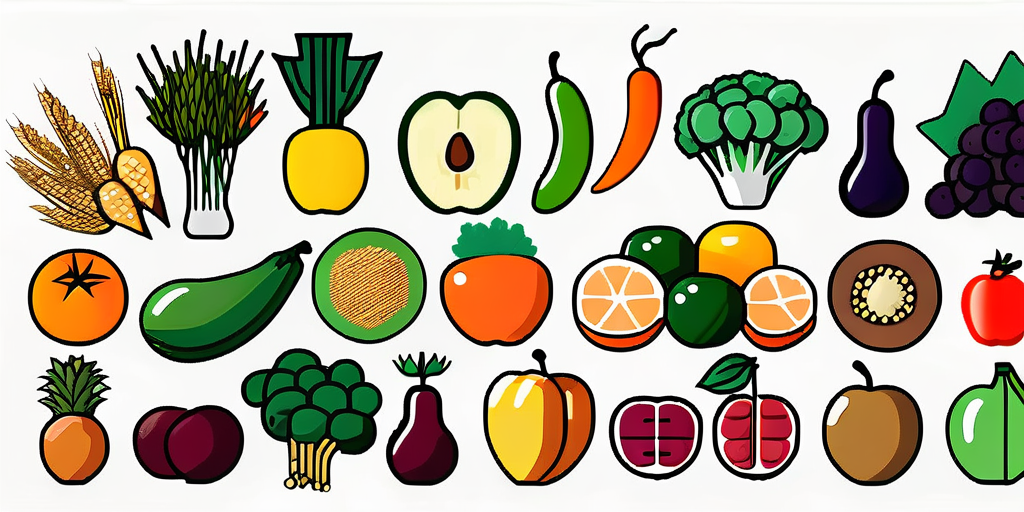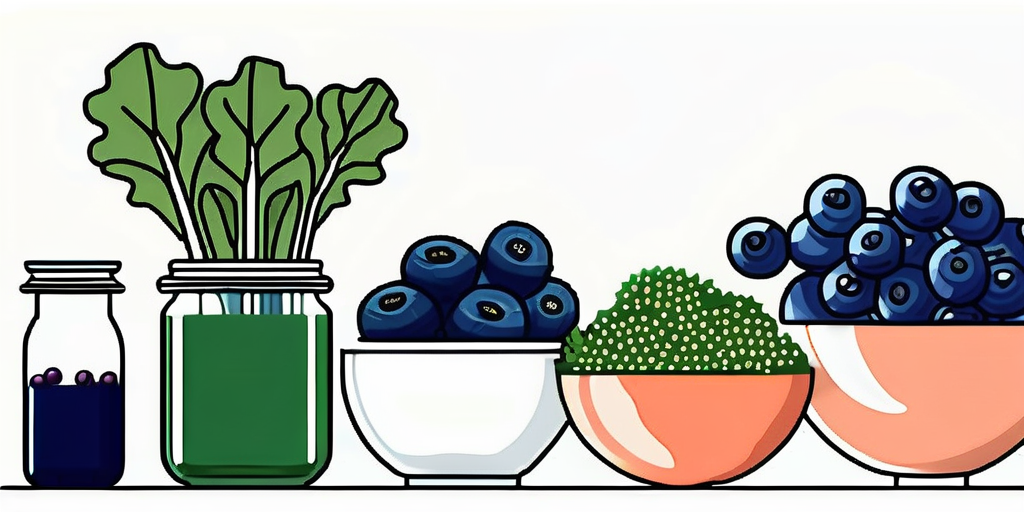In today's fast-paced world, it can be challenging to maintain a healthy lifestyle. We are constantly bombarded with advertisements for quick and convenient meals that may not be the best for our bodies. However, by taking a closer look at our diet and incorporating the healthiest foods into our meals, we can significantly improve our overall well-being. In this ultimate guide to the healthiest food in the world, we will explore the basics of nutrition, the health benefits of various food groups, the power of superfoods, and the importance of probiotics and prebiotics.
Understanding the Basics of Nutrition
Before diving into the world of healthy eating, it's essential to understand the basics of nutrition. Our bodies require two types of nutrients: macronutrients and micronutrients.
When it comes to macronutrients, they are the building blocks of our diet and provide us with energy. There are three primary macronutrients: carbohydrates, proteins, and fats. Carbohydrates are our body's main source of fuel and can be found in foods such as whole grains, fruits, and vegetables. They come in two forms: simple and complex. Simple carbohydrates, like those found in sugar and processed foods, are quickly digested and can cause a spike in blood sugar levels. On the other hand, complex carbohydrates, found in foods like whole grains and legumes, are digested more slowly, providing a steady release of energy.
Proteins, another essential macronutrient, are responsible for building and repairing tissues in our body. They are made up of amino acids, which are often referred to as the "building blocks" of protein. Our body needs 20 different amino acids to function properly, and while our body can produce some of them, there are nine essential amino acids that we must obtain from our diet. Good sources of protein include lean meats, fish, eggs, dairy products, and legumes.
Lastly, healthy fats are an important macronutrient that often gets a bad reputation. While it's true that some fats, like trans fats and saturated fats, can be harmful to our health, there are also healthy fats that are essential for our body. Healthy fats, such as those found in avocados, nuts, seeds, and olive oil, are important for brain function, hormone production, and the absorption of fat-soluble vitamins.
The Importance of Micronutrients
While macronutrients provide us with energy, micronutrients are vitamins and minerals that our bodies need in smaller amounts but are equally important. They play a crucial role in various bodily functions, from supporting our immune system to ensuring the proper functioning of our cells.
Vitamins are organic compounds that our body needs in small amounts to function properly. There are 13 essential vitamins, each with its own unique role. For example, vitamin C is known for its immune-boosting properties and is found in citrus fruits, strawberries, and bell peppers. Vitamin D, often referred to as the "sunshine vitamin," helps our body absorb calcium and is synthesized by our skin when exposed to sunlight. Good sources of vitamin D include fatty fish, fortified dairy products, and egg yolks.
Minerals, on the other hand, are inorganic substances that our body needs in small amounts. They are involved in various bodily functions, such as bone health, nerve function, and energy production. Calcium, for example, is essential for strong bones and teeth and can be found in dairy products, leafy greens, and fortified plant-based milk. Iron is another important mineral that is necessary for the production of red blood cells and can be obtained from sources like lean meats, beans, and fortified cereals.
Fruits, vegetables, and whole grains are excellent sources of essential micronutrients. They are packed with vitamins, minerals, and antioxidants that help protect our body against diseases and promote overall health. It's important to include a variety of colorful fruits and vegetables in our diet to ensure we are getting a wide range of micronutrients.
The Impact of Hydration on Health
Besides macronutrients and micronutrients, hydration is another vital aspect of our health. Staying properly hydrated can improve digestion, promote healthy skin, and even enhance cognitive function.
Water is essential for our body to function properly. It helps transport nutrients, regulate body temperature, and remove waste products. It's recommended to drink at least eight glasses of water per day, but individual needs may vary depending on factors such as activity level, climate, and overall health. In addition to water, other beverages like herbal tea and low-sugar fruit juices can contribute to our daily hydration needs.
Furthermore, certain foods can also contribute to our hydration. Fruits and vegetables with high water content, such as watermelon, cucumbers, strawberries, and lettuce, can help keep us hydrated. These foods not only provide water but also essential vitamins, minerals, and fiber.
In conclusion, understanding the basics of nutrition is crucial for maintaining a healthy lifestyle. By incorporating a balanced diet that includes macronutrients, micronutrients, and proper hydration, we can support our overall health and well-being.
The Healthiest Foods from Each Food Group
Now that we have a solid understanding of the basics of nutrition, let's explore the healthiest foods from each food group.

When it comes to maintaining optimal health, it's important to include a variety of nutrient-rich foods in our diet. Let's delve deeper into each food group and discover some of the healthiest options available.
Fruits and Vegetables for Optimal Health
Fruits and vegetables are not only delicious but also packed with essential vitamins, minerals, and antioxidants. These nutrients are vital for our overall well-being. Incorporating a wide range of colorful fruits and vegetables into our meals can provide numerous health benefits.
Leafy greens, such as spinach and kale, are rich in iron, calcium, and vitamins A, C, and K. Berries, like blueberries and strawberries, are loaded with antioxidants that help fight against free radicals and reduce the risk of chronic diseases. Citrus fruits, such as oranges and grapefruits, are high in vitamin C, which boosts our immune system. Cruciferous vegetables, like broccoli and cauliflower, contain phytochemicals that have been linked to a reduced risk of certain cancers.
The Power of Whole Grains
Whole grains are an essential part of a healthy diet. They are packed with fiber, which aids in digestion and helps us feel fuller for longer periods of time. In addition to fiber, whole grains provide essential nutrients like iron and B vitamins.
Quinoa, often referred to as a superfood, is a complete protein and a great source of fiber. Brown rice is another excellent whole grain option that is rich in manganese and selenium. Whole wheat bread is a healthier alternative to refined white bread, as it contains more fiber and nutrients. Oats, whether in the form of oatmeal or granola, are a fantastic way to start your day, providing a good amount of fiber and promoting heart health.
Lean Proteins and Their Benefits
Proteins are the building blocks of our body and play a crucial role in muscle growth, cell repair, and hormone production. When choosing protein sources, it's important to opt for lean options that are low in saturated fats.
Skinless chicken and turkey are excellent sources of lean protein. They are not only low in fat but also rich in essential amino acids. Fish, such as salmon and tuna, are packed with omega-3 fatty acids, which are beneficial for heart health. Tofu, a popular plant-based protein, is a great option for vegetarians and vegans. Legumes, including beans, lentils, and chickpeas, are not only high in protein but also provide fiber and other essential nutrients.
The Importance of Healthy Fats
Contrary to popular belief, not all fats are bad for you. In fact, healthy fats are crucial for our overall health and well-being. Including foods that contain monounsaturated and polyunsaturated fats in our diet can have numerous benefits.
Avocados are a great source of monounsaturated fats, which can help reduce bad cholesterol levels and promote heart health. Nuts, such as almonds and walnuts, are packed with healthy fats, fiber, and antioxidants. Seeds, like chia seeds and flaxseeds, are rich in omega-3 fatty acids and can help reduce inflammation in the body. Olive oil, a staple in the Mediterranean diet, is an excellent source of monounsaturated fats and has been associated with a reduced risk of heart disease.
By incorporating these healthiest foods from each food group into our diet, we can nourish our bodies with the essential nutrients they need to thrive. Remember, variety is key, so try to experiment with different fruits, vegetables, whole grains, lean proteins, and healthy fats to keep your meals exciting and your body healthy.
Superfoods and Their Health Benefits
In recent years, superfoods have gained popularity for their exceptional nutritional content and health benefits. These nutrient-dense foods are packed with vitamins, minerals, antioxidants, and other beneficial compounds that can support overall well-being and help protect against various diseases.

Let's take a closer look at some specific superfoods and the remarkable health benefits they offer.
The Truth About Berries and Antioxidants
Berries, such as blueberries, strawberries, and raspberries, are not only delicious but also incredibly nutritious. These vibrant fruits are packed with antioxidants that help protect our cells from damage caused by free radicals. Antioxidants play a crucial role in reducing inflammation, boosting the immune system, and preventing chronic diseases like cancer and heart disease.
Furthermore, berries are a great source of vitamins and minerals that support overall well-being. They are particularly rich in vitamin C, which is essential for collagen production, immune function, and healthy skin. Additionally, they provide a good amount of dietary fiber, which aids in digestion and helps maintain a healthy weight.
The Power of Green Leafy Vegetables
Green leafy vegetables like spinach, kale, and Swiss chard are nutritional powerhouses that offer a wide range of health benefits. These leafy greens are rich in vitamins A, C, and K, as well as iron and calcium.
Vitamin A is crucial for maintaining healthy vision, supporting the immune system, and promoting cell growth and development. Vitamin C is a potent antioxidant that helps protect against immune system deficiencies, cardiovascular disease, and eye diseases. Vitamin K plays a vital role in blood clotting and bone health.
Moreover, green leafy vegetables provide a good amount of dietary fiber, which aids in digestion, promotes satiety, and helps regulate blood sugar levels. They are also low in calories, making them an excellent choice for weight management.
The Benefits of Nuts and Seeds
Nuts and seeds, such as almonds, walnuts, chia seeds, and flaxseeds, are small but mighty when it comes to their nutritional value. These crunchy delights are packed with healthy fats, protein, fiber, and various vitamins and minerals.
Regular consumption of nuts and seeds has been linked to a reduced risk of heart disease. The healthy fats found in these foods, including monounsaturated and polyunsaturated fats, can help lower bad cholesterol levels, reduce inflammation, and improve blood vessel function.
Furthermore, nuts and seeds are a great source of plant-based protein, making them an excellent option for vegetarians and vegans. Protein is essential for building and repairing tissues, supporting immune function, and maintaining healthy hair, skin, and nails.
Additionally, nuts and seeds are rich in fiber, which aids in digestion, promotes feelings of fullness, and helps regulate blood sugar levels. They also contain various vitamins and minerals, such as vitamin E, magnesium, and zinc, which play important roles in overall health and well-being.
As you can see, incorporating superfoods like berries, green leafy vegetables, nuts, and seeds into your diet can provide a wide range of health benefits. Whether you enjoy them in smoothies, salads, or as a snack, these nutrient-dense foods can help support your overall well-being and contribute to a healthy lifestyle.
The Role of Probiotics and Prebiotics in Health
In addition to a well-rounded diet, incorporating probiotics and prebiotics into our meals can have a positive impact on our gut health.

Understanding Probiotics
Probiotics are beneficial bacteria that help maintain a healthy balance in our gut microbiome. They can be found in fermented foods like yogurt, sauerkraut, and kimchi. Probiotics support proper digestion, boost our immune system, and may even improve mental health.
The Importance of Prebiotics
Prebiotics, on the other hand, are a type of fiber that acts as food for the beneficial bacteria in our gut. They can be found in foods like bananas, onions, garlic, and whole grains. By consuming prebiotic-rich foods, we can support the growth of probiotics and improve our gut health.
In conclusion, understanding the basics of nutrition and incorporating the healthiest foods into our diet can significantly improve our overall well-being. Focusing on a variety of fruits and vegetables, whole grains, lean proteins, and healthy fats can provide us with essential nutrients and reduce the risk of chronic diseases. Additionally, incorporating superfoods into our meals and prioritizing gut health through the consumption of probiotics and prebiotics can further enhance our health. By making conscious choices about what we eat, we can take a crucial step towards a healthier and happier life.




